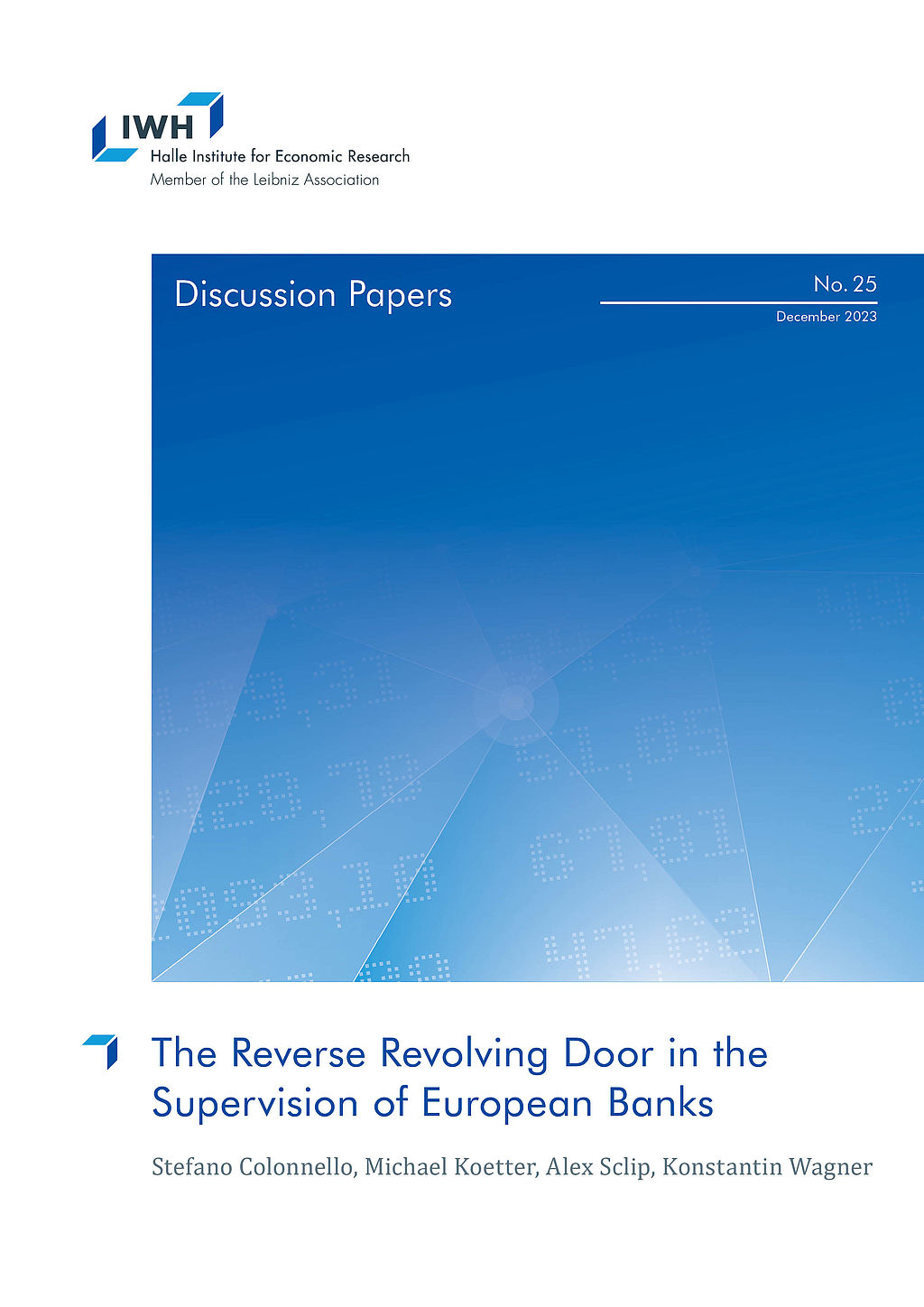Risk in the banking sector: four out of ten top supervisors come from the financial industry
The personal ties between Europe's banks and supervisory authorities in charge of prudential supervision are closer than previously realised. Almost four out of ten board members of national regulators have previously worked in the financial industry. This is revealed by a study of the Halle Institute for Economic Research (IWH): Those who have just been supervised often become supervisors themselves.
"The proximity between banks and supervisors harbours potential risks for financial stability."
This phenomenon can pave the way for lax regulation. At the very least, investors seem to be hoping for lenient control of the banks in question as indicated by excess returns on the stock market in response to the appointment of former employees to the board of the national regulatory authority. The IWH analysis highlights at least for the period before the introduction of the European Banking Union that credit institutions whose alumni were appointed supervisors held less equity and grew faster.
"The proximity between banks and supervisors harbours potential risks for financial stability," says Michael Koetter, Vice President and Head of the Financial Markets Department at the IWH. He co-authored the study with Stefano Colonnello, Alex Sclip and Konstantin Wagner. "The mere suspicion that, as supervisors, former bankers could favour their former employers can undermine trust in the institutions," says Koetter. "Politicians should improve banking supervision in order to safeguard the financial and economic system in Germany and Europe in line with the times."
Financial market researcher Koetter proposes three improvements:
(1) The selection process for leadership positions in banking supervision should be more open, diverse and complex. A selection committee in which politics, the financial industry, the real economy and civil society find the best person for a post in a public consultation process with several stages is desirable. So far, only politicians have decided on the personnel in a secret ballot.
(2) Before bank employees move to the Executive Board of the national financial supervisory authority, they should complete a waiting period of at least two years. For now, a seamless transfer is possible.
(3) A European transparency register for banks and their supervisors should be created. Thanks to new data, fund companies, insurance companies and other investors would gain more clarity about possible personal networks in the financial sector. This would enable them to better weigh up the opportunities and risks of their investments. The market would make a better contribution to disciplining banks.
For this IWH study, the economists collected and analysed data on the career paths of 185 top European supervisors. These individuals worked in a total of 13 national financial supervisory authorities in the ten largest European economies between 2002 and 2019. The analysis revealed that 38.6% of regulatory executives had previously worked in banks. The researchers were able to prove that the banks in question made excess gains on the stock market when these individuals took up their new positions. The results were subjected to several tests in order to rule out statistical spurious effects, which could have been caused by parallel policy decisions, for example.
Thanks to the new data, the IWH study makes it possible for the first time to weigh up the opportunities and risks of personal interdependencies between banks and supervisory authorities for the European financial market. Comparable analyses have so far concentrated on the US financial sector. In contrast to the USA, the EU is characterised by a complex, fragmented financial landscape due to the incomplete European Banking Union. For this reason, the national regulators which were analysed in the study play an important role in the stability of the financial and economic system in Europe.
Publications:
Stefano Colonnello, Michael Koetter, Alex Sclip, Konstantin Wagner: The Reverse Revolving Door in the Supervision of European Banks. IWH Discussion Paper 25/2023. Halle (Saale) 2023.
Michael Koetter: Der riskante Drehtüreffekt, in: WirtschaftsWoche, 08.03.2024 (available online under the title: Ein Jahr nach dem Bankenbeben: Wie die Finanzaufsicht reformiert werden sollte, in: wiwo.de, 11.03.2024).
Whom to contact
For Researchers

Vice President Department Head
If you have any further questions please contact me.
+49 345 7753-727 Request per E-MailFor Journalists

Internal and External Communications
If you have any further questions please contact me.
+49 345 7753-832 Request per E-MailIWH list of experts
The IWH list of experts provides an overview of IWH research topics and the researchers and scientists in these areas. The relevant experts for the topics listed there can be reached for questions as usual through the IWH Press Office.
Related Publications

The Reverse Revolving Door in the Supervision of European Banks
in: IWH Discussion Papers, 25, 2023
Abstract
We show that around one third of executive directors on the boards of national supervisory authorities (NSA) in European banking have an employment history in the financial industry. The appointment of executives without a finance background associates with negative valuation effects. Appointments of former bankers, in turn, spark positive stock market reactions. This „proximity premium“ of supervised banks is a more likely driver of positive valuation effects than superior financial expertise or intrinsic skills of former executives from the financial industry. Prior to the inception of the European Single Supervisory Mechanism, the presence of former financial industry executives on the board of NSA associates with lower regulatory capital and faster growth of banks, pointing to a more lenient supervisory style.



